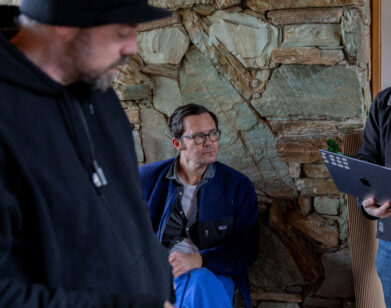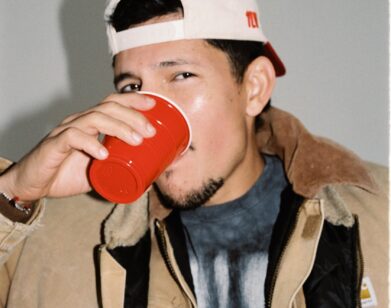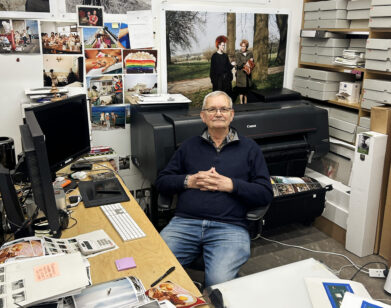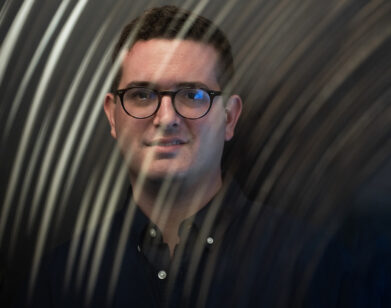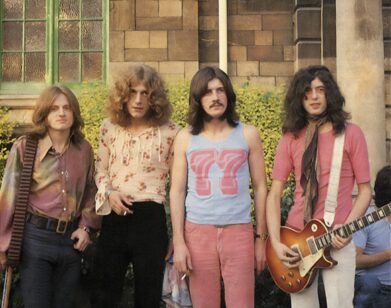Billy Bob Thornton’s Family Ties
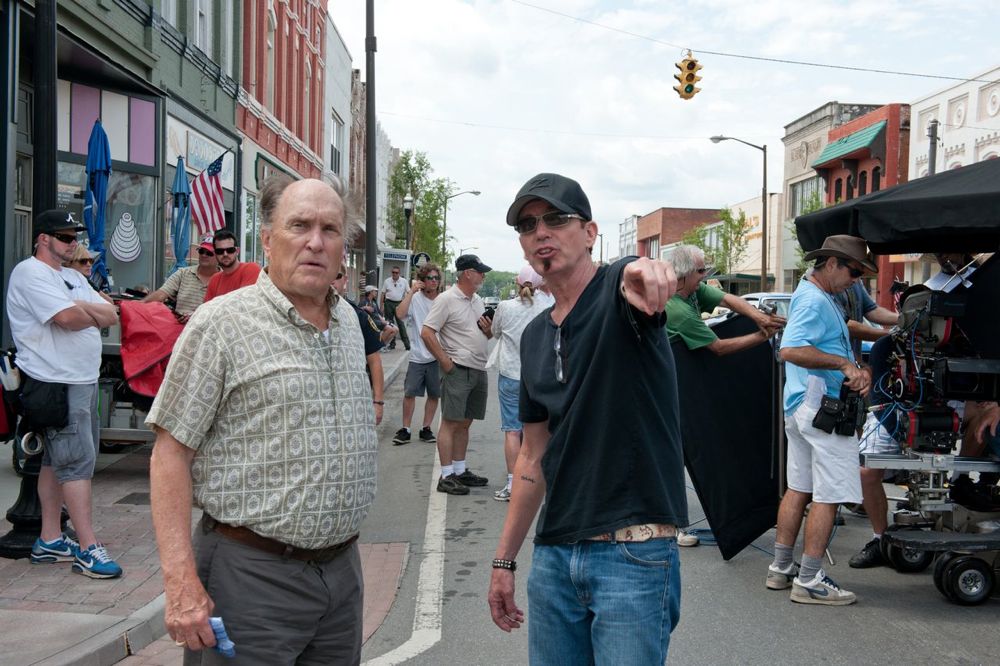
ABOVE: ROBERT DUVALL AND BILLY BOB THORNTON ON THE SET OF JAYNE MANSFIELD’S CAR.
“I wasn’t going to call it ‘Trouble in the Family,’ that sounds like a Lifetime movie,” Billy Bob Thornton tells us of his latest film, Jayne Mansfield’s Car. He is lamenting about reports that the film’s title is misleading. “Obviously, the title is a metaphor for the romanticism of tragedy,” says Thornton.
Co-written with his writing partner Tom Epperson, Jayne Mansfield’s Car is the first film Thornton has directed in 11 years. It is not about the premature death of the ’50s pinup; rather, Thornton plays Skip Caldwell, one of four siblings in an Alabama family ruled by patriarch Robert Duvall. It is 1969. Skip is over 50 and still lives in his father’s home. Along with his older and younger brothers (played by Robert Patrick and Kevin Bacon, respectively), Skip never quite recovered from his service in World War II. “It’s not exactly autobiographical,” Thornton explains, “but some characters are loosely based on people I grew up around or family members.”
Like any good family drama, it is a funeral that forces the Caldwells to confront one another. The film begins with a phone call: Skip’s estranged mother has died and her second, British husband (John Hurt) is flying to Alabama with his grown children, Camilla (Frances O’Connor) and Phillip (Ray Stevenson), to bury her.
EMMA BROWN: Robert Duvall’s character in the film is obsessed with car crashes, and I heard that this was inspired by your dad.
BILLY BOB THORNTON: Yeah, he used to take me to them when I was a little kid. It was kind of weird. I actually saw Jayne Mansfield’s car when they brought it around to my town.
BROWN: I didn’t know they really did that.
THORNTON: It’s weird, isn’t it? He took me out there and you paid a dollar—or whatever it was—to look inside, just like in the movie. [laughs]
BROWN: Skip has an interesting moment with his stepsister, Camilla. What do you think Camilla’s attraction to Skip is?
THORNTON: Camilla’s pretty eccentric anyway, and so I think she’s just fascinated by characters. I think she just finds Skip fascinating as a creature: “If he’s got the balls to act the way he does around me, and he just met me, then maybe this is worth it.” She sees herself as an outsider in her own family and Skip is obviously the outsider in his family, so I think there’s a connection. I also think she’s just fascinated with this oddball.
BROWN: It seems like everyone is a bit of an outsider.
THORNTON: They’ve all got their problems. [laughs] You also have some strange bedfellows, like Duvall and John Hurt actually end up seeing eye to eye about everything because of their experience with their kids and with the war. People come together in this movie—nothing is completely resolved, but you can see that they’re at least on the road of listening to each other a little more.
BROWN: Why is it so hard for Robert Duvall’s character to be openly affectionate with his sons?
THORNTON: My dad was like that. Men of a certain generation were just not forthcoming with their feelings. My dad didn’t hug me every day and say he loved me and anything like that. It was just not a thing that those guys at that time did.
BROWN: Do you make a point to be more emotionally forthcoming with your children?
THORNTON: Oh, absolutely. My kids are like, “Damn, would you quit slobbering on my hair?” I tell them I love them when they walk into the room—it’s ridiculous. I went exactly the opposite [way] from my dad.
BROWN: Do you play all of the different characters in your head when you’re writing a script?
THORNTON: Yeah, you have to. If you want anybody to have a different voice, you really have to visualize and hear the voices of all these people. Sometimes when I write with specific actors in mind, it helps. Even if they don’t end up doing the movie, it gives the character a voice. Usually when I’m writing, I kind of know what it is before I start writing and I write stream of consciousness style. I don’t know how to type so I handwrite everything.
BROWN: When you start a new draft, do you just rewrite the whole thing from the beginning?
THORNTON: No, I’ve rarely rewritten stuff. On this one Tom and I ran into a couple roadblocks because we had this other subplot going on in the movie, and that was the only thing that changed—we decided to drop that, and then that changed a few things.
BROWN: What’s the best directing advice that you’ve ever gotten?
THORNTON: Well, I never got a whole lot of advice; I kind of always winged it. I’m more influenced by novelists than I am by filmmakers, and that’s why I run into a lot of trouble sometimes. These days movies are cut very quickly and sort of fragmented and I tend to do slower moving stories where people develop relationships with people. I think I’d probably do a lot better if I lived in Europe—I think it’s more of a European sensibility somehow. [laughs] I’ve watched other directors as an actor and I picked up little things here and there about cameras, [but] I wouldn’t consider myself the guy you’d want to hire to do Star Trek. I’m not really a full-time director, I just like to direct the things that I write because I think I’m going to know it better than someone else.
BROWN: Do your actors come to you with questions about the script, or do you try to step away from your role as a writer once you start directing the film and let your actors take over the character as soon as they have the script?
THORNTON: If they have ideas, that’s great, but for the most part I just try to hire a person who’s right for it and who’s going to do it just the way it is already. I always have an idea before we even start the movie because if you hire the wrong person, within a couple of days you’re going to know that and you’re going to be really panicked. [laughs]
BROWN: Have you ever hired the wrong person?
THORNTON: I don’t think so, not so far. All the actors I’ve worked with as a director over the years I really love and I thought they were all right for the part. Some of the other actors [in this film] were old friends of mine and then there are some new ones, too—people that I didn’t know that I’ve loved. Mary Vernieu, my casting lady, she’s very good and I said, “I don’t know any kids to play the grandkids!” And she brought these guys in and they were perfect. Also Katherine LaNasa, Ray Stevenson, Shawnee Smith—I didn’t know any of them before this movie, so it was a great thing to be able to meet them and work with them. Ron White’s an old friend, Kevin Bacon I’ve known for a long time, and Robert Patrick I directed before in All The Pretty Horses, so a lot of them I was friends with.
BROWN: Tippi Hedren is listed as playing Naomi Caldwell, Skip’s mother, on IMDb. Was she ever in the film?
THORNTON: One of the real tragedies of the movie, I was asked by the executive branch of the movie to lose the scenes with her. She was in two scenes in the beginning and she was fantastic. I can understand it; when you make a movie and you know you have to cut it down to two hours, sometimes certain scenes have to go because if you take them out, the story doesn’t really suffer so much. I could understand how we could still have the movie that we wanted, but I sure miss them. It was such an honor to be able to work with her—I wish she was still in. There’s always the DVD, right?
BROWN: Films about the South often fall back onto certain clichés. Is there a novel or film that you think is a more accurate presentation of the South?
THORNTON: There haven’t been that many movies made by people from the South until lately. The movies I’ve made about the South, they were my experience and it’s something that I know. If I were asked to do a movie about New Hampshire, I probably wouldn’t be the best guy for it. [laughs] In terms of a novel, I guess To Kill A Mockingbird—but even with To Kill A Mockingbird there are things about it that I think don’t ring true. Gone With the Wind, people love that movie and I totally get that and I understand why: it’s a huge soap opera with melancholy music and thousands of extras. But if you get right down to it, it’s kind of hammy in a lot of places and the people don’t seem remotely Southern to me. [laughs] I guess it’s a weird thing to say—I love that movie but at the same time I don’t buy it at all. [laughs]
BROWN: We interviewed you and Robert Duvall in 1998, and you mentioned that you really wanted to make a film about the Hatfields and the McCoys. Are you disappointed that someone beat you to it?
THORNTON: Well, it was for television so I think it is still open to be done for a theater someday. I think it doesn’t necessarily cancel it out. I remember when I did Armageddon (1998), there was a movie called Deep Impact (1998) that actually had Duvall in it: two movies about an asteroid hitting the earth that went out at the same time. I don’t think Hollywood minds that much.
JAYNE MANSFIELD’S CAR IS CURRENTLY SCREENING IN NEW YORK AND ON VOD.

